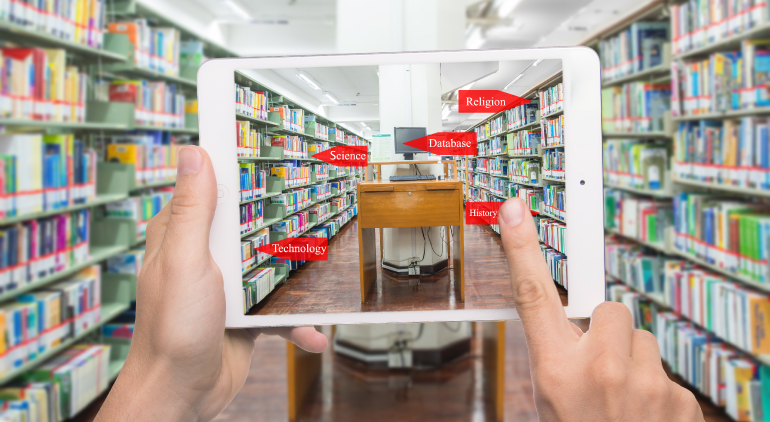I was listening to a StoryCorp episode this week, one where a son and granddaughter talked with their grand/mother about her life. It was short, but sweet in a way that brought tears to my eyes (I am sucker for stories about kids and their moms). And it had me thinking about how we will share stories in the future. What does sharing stories in the library look like in a highly interconnected, interactive technology rich world, specifically, within an academic setting?
The Pew Research Center’s predictions for 2025 come to mind as I explore this question when they say, “people’s relationship with technology will deepen as larger segments of the population come to rely more on digital connections for work, education, health care, daily commercial transactions and essential social interactions. A number describe this as a “tele-everything” world” (para. 2). In this tele-everything world, I imagine augmented reality and its beefier brother, Mixed-reality, will be the norm in libraries everywhere. Look at Microsoft HoloLen’s 2, a mixed modal virtual reality device to interact with the physical world with virtual capabilities. Already we are seeing the applications of this in today’s world in medicine and education. Now imagine this in academic libraries: students will be able to step-in and be able to interact. Like to reserve a study room? Right there on the spot via a drop down menu or some other form of interactive display. Oh, you are browsing through a book and want to learn more? As the book is opened or picked up there could be a plethora of options for video content, recorded reviews or audio readings. Need assistance with a research question or finding a particular book? Long gone is the reference desk. Instead, librarians will be able to interact with students on the spot through a virtual avatar.

If we are thinking about librarians as virtual avatars, I think most people’s natural fear goes to will librarians even be needed in the library? Like most things, it is a yes, and a no. I think librarians will still be important to implement programs and give much needed research advice but there will be a shift in how librarians will be asked to do their job duties. Much how librarians have changed from gatekeepers and collectors of knowledge to propagators and stewards there will be a transition period. I believe librarians will have more time to be explorers and innovators. To connect with patrons in a way that they may not today. But there will also be libraries, especially in rural areas or areas where staffing may be limited, where automation will be a necessity. For example, the Scott County Self-Serve Library already sets itself as a pilot example for the future. Where patrons will be able to check out books, movies, music, or go beyond that to do whatever their information needs are all in one place with the help of a virtual librarian. It will be a beautiful world, with an informed populace and librarians to help guide the way.
ooh, cool stuff here! Also, I appreciate how hopeful & optimistic your posts are, Cesar. Thinking especially of your closing lines here:
“Where patrons will be able to check out books, movies, music, or go beyond that to do whatever their information needs are all in one place with the help of a virtual librarian. It will be a beautiful world, with an informed populace and librarians to help guide the way.”